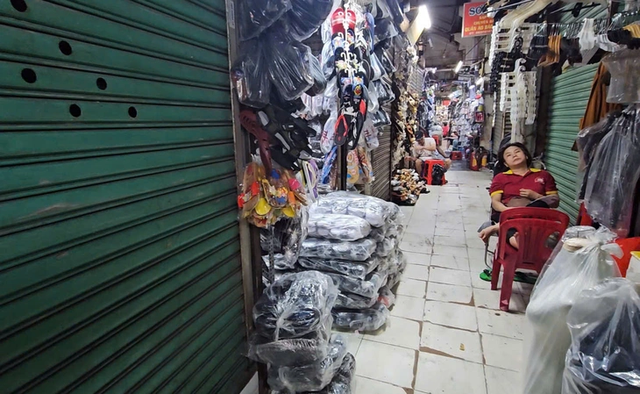
Ho Chi Minh City struggles to revive traditional markets
Amid a sharp drop in customers and sales at traditional markets in Ho Chi Minh City, many vendors and market managers have proposed solutions, calling for stronger state intervention to attract shoppers back.
The Ho Chi Minh City Department of Industry and Trade is developing a comprehensive plan to revitalize traditional markets in response to digital transformation and evolving consumer habits.
The plan includes measures related to infrastructure, zoning, and functional transformation of markets.
Sluggish traditional markets
Many traditional markets in Ho Chi Minh City are seeing a sharp decline in footfall, leaving numerous vendors in prolonged difficulty and forcing some to shut down entirely.
Ngo Thi Dong, a vendor at Ba Chieu Market, once a bustling spot thanks to its prime location, said that business has become increasingly difficult since the COVID-19 pandemic, especially for fashion vendors, many of whom go entire days without a single customer.
She added that many vendors are holding on not only for economic reasons but also out of their attachment to tradition and family legacy.
Some families have sold merchandise at the same market for three generations.
Similarly, Trinh Thi Huong, a fashion vendor at Thu Duc Market, spends most of her time scrolling on her phone and chatting with fellow stall owners.
Despite the market's broad offerings—food, cosmetics, and household goods, among others—only food stalls are seeing modest activity, while other sectors face ongoing stagnation.
She noted that sales have dropped 70 percent compared to pre-COVID times. Even when she is selling at cost price, few customers are buying.
Bui Thi Anh Nguyet, the manager of Pham Van Hai Market in Tan Son Hoa Ward, said the market was originally designed with 1,698 stalls, but only about 900 are currently in operation. The rest are closed or used as storage.
The decline in active vendors over the past two to three years has severely impacted the market's revenue and challenged its maintenance and management, Nguyet said.
Without fundamental solutions, she warned, market abandonment and partial operation could become widespread across the city.
Insiders propose solutions
A representative of Xom Chieu Market pointed out that deteriorating infrastructure, such as broken drainage systems and unkempt facilities, discourages shoppers.
Additionally, unregulated roadside markets that have surged post-pandemic are surrounding and hurting traditional market operations.
The representative called on authorities to upgrade deteriorating markets and crack down on informal vendors occupying sidewalks and roads, arguing that legitimate market traders pay taxes and fees, while illegal ones do not.
At Binh Tay Market, vendor Nguyen Van Quyen acknowledged past government efforts to train vendors in online selling and live-stream marketing but said the results fell short.

The sluggish business at traditional markets, especially in the fashion sector, is becoming increasingly severe. Photo: Q. Bao
Many sellers are older and unfamiliar with digital tools, while their cramped stall spaces are ill-suited for live-streaming.
He urged the government to adopt long-term policies that support online business transitions and even suggested closing ineffective markets to consolidate resources for more promising ones.
Nguyet added that in addition to infrastructure and functional improvements, the government should re-examine tax and regulatory policies for e-commerce platforms.
The rise of online retail with surprisingly low prices has made it nearly impossible for traditional vendors to compete, even when selling below cost.
She questioned whether current tax policies for online sellers are fair compared to traditional businesses.
Another market manager noted discussions around reviving traditional markets as tourism and cultural experience hubs.
However, for this approach to be effective, clear policies are needed to support traders and connect them with tourist sources.
Forum for industrial and commercial development in Ho Chi Minh City
Tuoi Tre (Youth) newspaper, in collaboration with the Ho Chi Minh City Department of Industry and Trade, has launched the forum 'Contributing Ideas for Industrial and Commercial Development in Ho Chi Minh City.'
The initiative invites ideas and proposals from businesses, researchers, and citizens to build a stronger industrial-commercial-service economy with international competitiveness.
According to Bui Ta Hoang Vu, director of the Ho Chi Minh City Department of Industry and Trade, the department values and welcomes all public feedback, which will be used to advise the city’s leadership on breakthrough development strategies.
Readers can send contributions to Tuoi Tre at 60A Hoang Van Thu Street, Duc Nhuan Ward, Ho Chi Minh City, or by email to: kinhte@tuoitre.com.vn.
Thanh Ha - Quang Bao / Tuoi Tre News
Link nội dung: https://news.tuoitre.vn/ho-chi-minh-city-struggles-to-revive-traditional-markets-103250803161819727.htm